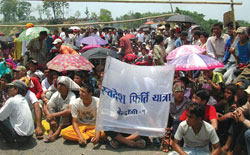|
|
The Long March planned by Bhutani refugees in camps in Jhapa has been postponed again. Refugee leaders, who had planned to resume their thwarted journey back to Bhutan through India today, appear temporarily mollified by the seeming softening in India's position earlier this week.
The 10 June statement by India's minister for external affairs, Pranab Mukherejee, that the Bhutani refugee issue is an international problem was, on the surface, a sharp departure from India's previous position, that it was a bilateral problem between Nepal and Bhutan.
Yet, in the same statement Mukherjee also said that "if these 100,000 people enter Bhutan it would create a demographic imbalance"-a line regularly taken by Bhutani authorities and apologists for the expulsion of Bhutanis of Nepali origin. It seems unlikely, therefore, that India's new position includes being directly involved in or mediating talks between Nepal and Bhutan.
In the camps here, such statements are taken as an indication that India will again look away as Thimphu prepares to disenfranchise and expel the over 80,000 Bhutanis of Nepali origin still in Bhutan ('Replacement population', #348).
With the third-country resettlement option becoming a reality, the frame of reference of the repatriation argument has shifted from Bhutan's evasive excuses to India's refusal to accept responsibility for its role in the refugee crisis.
India, which shares a border with Bhutan, should have been the first country of exile for the refugees. Instead, "India loaded Bhutanese citizens onto trucks and buses and dropped them off in Kakarvitta," says Vidhyapati Mishra, general secretary of Association of Press Freedom Activists-Bhutan (APFA-Bhutan).
Now, the refugees say, they want passage back home. "India should do the same now and drop us off in Bhutan," argues Ratna Maya Giri, who lives in the Beldangi II camp.
Meanwhile, there is growing tension between those who want to return and those who want to move to third countries. Two refugees were killed last month in the Beldangi camp in riots over precisely this question. Many refugees insist that resettlement is capitulation to Bhutan's tactics.
On 29 May, about 15,000 refugees-mostly women and teenagers-took to the Mechi Bridge, in what they described as their 'long march to Bhutan.' The Indian Border Security Force baton-charged the crowd and then fired live bullets to stop the refugees from entering India. Saha Bahadur Dewan, a refugee from Pathari camp, died of bullet wounds, and over 100 were injured in the clash.
The temporary lull that followed after meetings between refugee leaders and Indian and Nepali officials continues, though the Long March was meant to resume today. Yesterday the National Front for Democracy, a coalition of Bhutani political parties working towards repatriation, announced that the march would be postponed by a month.
Refugee sources say that the deal will hold as long as India honours its promises to provide compensation for Dewan's family and free treatment for those injured last month, and more important, convene four-way talks between refugee groups, and Indian, Nepali, and Bhutani authorities.
"India should prove that it really is a great democracy by respecting the right to return of every exiled Bhutani," says APFA-Bhutan's Mishra.



